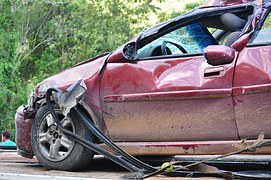What is PIP? How Does Baltimore Personal Injury Protection Work?
Personal injury protection [PIP] benefits are ‘no-fault’, ‘first-party’ insurance benefits.

‘No-fault’ means that you get these if injured in a an automobile accident, no matter what the blame for the accident is. [Of course, you’re not eligible if you intentionally caused the this automobile accident, or if you were committing a felony that led to the accident.] ‘First-party’ means that it is your insurance. You pay for it. The minimum coverage is $2500 and your insurer has to offer it to you, and you must decline it in writing if that is your choice. You can buy more coverage.
This insurance coverage pays your reasonable and necessary medical expenses and/or 85% of your lost wages.
Most insurers generally tend not to challenge the wage loss benefits upon submission of appropriate proof, but frequently refuse to pay, or reduce, the charges of some medical providers. PIP carriers refuse to pay or “reduce” medical bills. PIP law requires that insurers pay all “reasonable” and “necessary” medical expenses for the insured. Insurers frequently contest if a service was “necessary”, which the courts define as something that in light of the patients condition, and in light of other possible treatments, had some “efficacious value” Sabatier v. State Farm, 609 A.2d 307. More often, insurers contest if the charge for the service was “reasonable”, and refuse to pay it. As you may well imagine, no Maryland car accident lawyer has ever seen a case where an insurance company refused to pay because the charge was too low, and therefore unreasonable. As Attorney Eric T. Kirk will tell you.
Insurance companies routinely refuse to honor charges that they view as too high, or “reduce” charges to a level that the carrier, arbitrarily, decides is “reasonable”. Amazingly, there is no authority in Maryland law authorizing this process, and the person making the arbitrary decisions as to what is a “reasonable” medical charge is rarely, if ever, a doctor.
The value of a case is affected by PIP benefits [e.g. medical expenses that may otherwise have to be paid by settlement or judgment funds may be paid by PIP, which is “first-party” insurance [i.e. it is the injury victim’s coverage.]

The purpose of PIP is to provide for the speedy payment of medical charges without regard to fault. Passengers in buses, taxicabs and state-owned vehicles don’t get PIP benefits. There may be exceptions that should be explored where the injured person is covered under a separate PIP policy.
One final word on PIP. You have PIP unless you say you don’t want it.* A person may waive their statutorily mandated PIP coverage, but there are specific requirements: the waiver must be in writing, on a form approved by the Insurance Commissioner, and the insurer must advise the person of the consequences of a waiver.
*The Assembly has recently enacted a change in this process. Marylanders now have the option of carrying less insurance. An insured may now reject personal injury protection altogether, under specific circumstances. See Insurance Article, Md. INSURANCE Code Ann. § 19-506.1.



